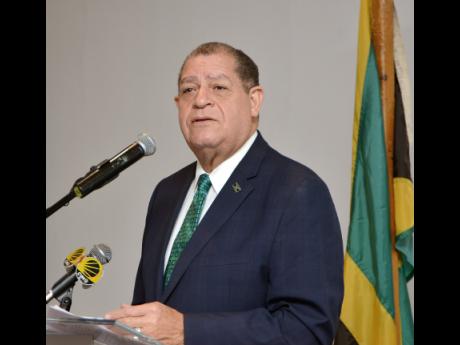Shaw has big plans for idle sugar lands
St Catherine, Clarendon, and Trelawny are the parishes where sugar land has been identified for divestment in the first phase of a plan by the Government to put thousands of idle acreage into crop production.
Minister of Industry, Commerce, Agriculture and Fisheries Audley Shaw on Wednesday announced the rationale behind efforts to fast-track the diversification of state-owned land under the auspices of the Sugar Company of Jamaica (SCJ) Holdings, the entity responsible for divesting five sugar factories and six estates formerly owned and operated by Government.
"We know that we can no longer rely on any one or two main crops. We know about sugar. I met with the Sugar Company Holdings of Jamaica yesterday, and next week, I am getting the final rationalisation plan from them for lands particularly in St Catherine, in Clarendon, in Trelawny, and what I can say is that there is a lot of excitement out there," Shaw told a Jamaica Country Forum stakeholders' meeting at the Medallion Hall Hotel, St Andrew.
"While we have thousands and thousands of acres of idle arable land, you know what the good news is? We have hundreds of applications from farmers and companies who want land to produce other things. Some want to produce vegetables, onions, sweet corn, and (West Indian) Sea Island cotton. With castor beans that grow wild, we need to grow it as an industrial crop. I've just identified 2,000 acres of land in the Mitchell Town area of Clarendon we're gonna put straight into castor bean production. I met with the castor bean association recently (and) they want land. They're gonna get land."
Mango is among the fruits identified for targeted cultivation to meet export demands under the new national crop diversification project.
"I set aside 500 or more hectares of land to start a mango agro park. You know why? We have gotten approval from the United States Government to export fresh mangoes to the US, using a technology called irradiation, so we gonna export. Can you imagine when our sweet mango dem go to America what going to happen to the ones from Mexico and all the places like that? When you taste it, it don't even taste like mango, nuh true?"
Shaw then went on to point out that Jamaica still has a lot of work to do in terms of meeting the export demand for mango as well as other crops.
OTHER CROPS
"You have to have mango orchards properly maintained, properly supervised. So a mango agro park can be the first of many, and there are so many other things, like bamboo, coconut. While the global market for coconut is growing topsy turvy, the only thing the coconut industry wants to do down here is to assess more fees from coconut and other oil products coming into Jamaica. What about planting more coconuts in Jamaica?" the minister asked.
"We gonna plant more coconuts in Jamaica. An Englishman in England who have (sic) 12 million trees in Guyana wants to start planting coconuts here in Jamaica. He has bought his first 2,000 acres of land that's now suffering from citrus greening disease that not even Florida find the cure for yet. He wants to put that into coconut. GraceKennedy, the largest seller of coconut products into Canada, can't get any coconut products from Jamaica. They buy from Thailand. No man, we can't continue like this!"
Lamenting the hundreds of thousands of acres of land lying fallow across Jamaica, the member of Parliament for North East Manchester promised that this state of affairs would not be allowed to continue for much longer.
He told the meeting: "I won't have time to get into the list of alternative things that can be produced and will be produced over the next few months and weeks. It's going to be very exciting for me because we will be appropriating land. We won't be selling land. We are leasing land - so issue it or lose it."

